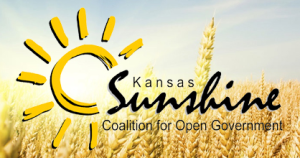Advocates of open government have good reason to celebrate this Sunshine Week, a national celebration of government transparency, which runs from Sunday, March 12, through Saturday, March 18. In Kansas, the week also represents an annual commemoration of the Kansas Sunshine Laws, which primarily include the Kansas Open Records Act (KORA) and the Kansas Open Meetings Act (KOMA). Under these laws, members of the public can exercise their right to request access to government records and meetings to learn how public officials exercise their power.
In Kansas one cause for celebration is a successful exercise of open government rights by a member of the public from Independence, with the assistance of the Kansas Attorney General’s Office. This success is proof that remedies are available to Kansans who feel their government is less transparent than it should be. For her work in promoting open government over several years and in pursuing her complaint of an open records violation to the highest levels of state government, the Kansas Sunshine Coalition is awarding a 2017 Friend of Open Government to Debbie Miller.
In April of last year, Ms. Miller, a longtime resident of Independence, made a request under the open records act for a copy of the form the city uses to evaluate the city manager’s job performance. Ms. Miller was not requesting any personally identifiable information related to any performance evaluation; she simply wanted a copy of the blank form itself.
Although the KORA provides access to many documents in the possession of public agencies, those agencies can legally deny access to a document if it falls within an exception in the law. For example, under the KORA, a public agency is not required to disclose “[p]ersonnel records, performance ratings or individually identifiable records pertaining to employees or applicants for employment.”
This “personnel record exemption” is the reason the Independence city administration gave Ms. Miller to justify withholding the blank form she had requested. The city also asserted that it did not have to disclose the form because it “was specifically created to assist in the evaluation of Mr. Micky Webb, the Independence City Manager.”
However, Ms. Miller was not satisfied with that response. She believed that a blank form was public information that could not possibly be exempt from disclosure as a personnel record. Believing the city was in violation of the law, she filed a complaint with the Kansas Attorney General’s Office in May of 2016.
After a lengthy and thorough investigation, the Attorney General’s Office found that the city had indeed violated the KORA. In a letter to the city dated January 30, 2017, Assistant Attorney General Lisa Mendoza wrote that the blank form was “sufficiently generic that it raised a question about whether it was in fact ‘specifically created solely to assist in the evaluation of” the city manager.” Moreover, according to Ms. Mendoza’s letter, a Google search showed that an “identical” document produced by another source existed on the internet.
Thus, the Attorney General’s Office concluded that the city “fell well short of meeting its KORA obligations,” and found the city in violation of law for the manner in which it had responded to Ms. Miller’s request. In turn, the city commissioners signed a “Consent Decree” admitting that the city violated KORA, agreeing to pay a $250.00 fine, and also agreeing, going forward, to “comply with the requirements of the KORA…in responding to each KORA request it receives.” Meanwhile, the City Commission voted not to renew the contract of the city manager, and has begun a search for a new city manager.
The finding of a KORA violation, resulting in the fine and the consent decree, reflect well on the Attorney General’s Office and indicates it is making good use of expanded Sunshine Law enforcement powers granted by the Kansas Legislature in 2015. Still, sunshine would not have come to Independence without Ms. Miller’s determined efforts to challenge the city’s refusal to disclose a blank form. She is an inspiration to members of the public everywhere who are concerned about transparency in government, and she proved that persistence pays off.
This Sunshine Week is a time to celebrate the initiative of Ms. Miller as a concerned member of the public, coupled with action by the state’s open-government enforcement agency, to effectuate change. The process of asserting rights under the KORA and KOMA can often be akin to the state’s motto, “to the stars through difficulties.” However, Ms. Miller’s successful efforts and the city’s decreed consent to abide by the law suggest that more sunshine may be on the horizon in Kansas.
Max Kautsch is a member of the board of directors of the Kansas Sunshine Coalition for Open Government. He also represents members of the public seeking to assert their rights under the Sunshine Laws, including Debbie Miller.

